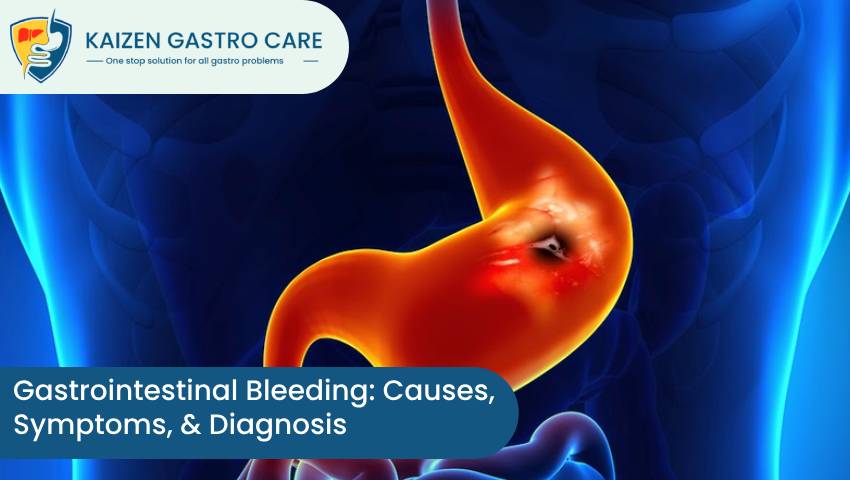
- 02/04/2024
- Kaizen Gastro Care
- 0 Comments
- Digestive Disorder
Gastrointestinal Bleeding: Causes, Symptoms, & Diagnosis
Gastrointestinal bleeding can be a concerning medical issue that requires prompt attention and proper diagnosis. From minor issues to life-threatening emergencies, understanding the causes, recognizing symptoms, and obtaining an accurate diagnosis are crucial steps in managing this disease. At Kaizen Gastro Care, we prioritize comprehensive care and effective management strategies for patients experiencing GI bleeding.
Understanding Gastrointestinal Bleeding:
Gastrointestinal (GI) bleeding, also known as digestive bleeding, refers to blood loss anywhere in your digestive tract, which runs from your mouth to your anus. It can be a minor issue or a symptom of a serious underlying condition.
Causes of Gastrointestinal Bleeding:
According to our best gastroenterologist in Pune, Dr. Vikrant Kale, GI bleeding can originate from different parts of the digestive system, ranging from the esophagus to the rectum. Common causes include:
- Peptic ulcers: Open sores that form on the lining of the stomach, small intestine, or esophagus.
- Gastritis: Inflammation of the stomach lining, which can lead to erosions and bleeding.
- Gastroesophageal reflux disease (GERD): Chronic acid reflux can lead to irritation and erosion of the esophagus lining.
- Esophageal varices: Enlarged veins in the esophagus, often due to liver disorder, which can rupture and cause severe bleeding.
- Colorectal polyps or cancer: Abnormal changes in the colon or rectum that can bleed.
- Diverticulosis: Small pouches that form in the walls of the colon, which can bleed if they evolve inflamed or infected.
- Inflammatory bowel disease (IBD): Conditions like Crohn’s disease or ulcerative colitis can cause inflammation and bleeding in the digestive tract.
- Mallory-Weiss tears: Tears in the lining of the esophagus, often caused by severe vomiting or retching.
- Hemorrhoids: Swollen blood vessels in the rectum or anus that can bleed, specifically during bowel movements.
- Medications: Certain medications, like non-steroidal anti-inflammatory drugs (NSAIDs), can upset your stomach lining and improve bleeding risk.
Symptoms of Gastrointestinal Bleeding:
The location and intensity of the bleeding can affect the symptoms of gastrointestinal bleeding. Common symptoms include:
- Bright red or dark stools
- Black, tarry stools (melena)
- Vomiting blood
- Weakness or fatigue due to anemia
- discomfort or pain in the abdomen
- Fainting or dizziness
- Difficulty breathing or Shortness of breath
- Rapid heartbeat
Diagnosis of Gastrointestinal Bleeding:
Diagnosing GI bleeding often involves a combination of medical history review, physical examination, and diagnostic tests. At Kaizen Gastro Care, our expert gastroenterologists, Dr. Vikrant Kale & Dr. Samrat Jankar utilize state-of-the-art technology to accurately diagnose GI bleeding. Common diagnostic methods include:
- Endoscopy: A technique in which a thin, flexible tube with a camera is used to visualize the inside of the digestive tract and determine sources of bleeding.
- Colonoscopy: Examination of the colon and rectum using a long, flexible tube with a camera.
- Capsule endoscopy: Swallowing a small, pill-sized camera that takes pictures as it travels through the digestive system, allowing for visualization of the small intestine.
- Angiography: Injection of contrast dye into blood vessels to identify sources of bleeding using X-ray imaging.
- Imaging tests: X-rays, CT scans, or angiography may be used to locate areas of bleeding within the gastrointestinal tract.
- Laboratory tests: Blood tests can assess levels of hemoglobin and other markers of blood loss.
- Stool test: This test can check for hidden (occult) blood in your stool.
Treatment:
Treatment for GI bleeding depends on the reason and seriousness of the bleeding. Some treatment options include:
- Medications: such as acid reducers or antibiotics, depending on the cause.
- Endoscopic procedures: to stop bleeding or remove the source of bleeding.
- Surgery: in severe chances, surgery may be necessary to repair or remove the bleeding source.
How To Prevent Gastrointestinal Bleeding:
You can take precautions to lower your risk and preserve the health of your gastrointestinal tract, but gastrointestinal bleeding can be a serious medical emergency. Prevention is just as important as complete care at Kaizen Gastro Care. To help stop gastrointestinal bleeding, consider the following helpful advice:
- Make sure your diet is high in fiber-containing foods including fruits, vegetables, and whole grains.
- Limit your intake of coffee, alcohol, and spicy meals
- Keep yourself hydrated.
- Manage Stress
- Regular Exercise
- Take action to stop smoking if you currently do.
- Limit NSAIDs and aspirin
- Avoid Alcohol Abuse
- Keep a healthy weight
Conclusion:
Gastrointestinal bleeding can be a serious medical situation that requires prompt evaluation and treatment. At Kaizen Gastro Care, our team of experienced gastroenterologists is dedicated to providing comprehensive care for patients with GI bleeding, using state-of-the-art diagnostic techniques and personalized treatment plans.
If you or a loved one are experiencing symptoms of GI bleeding, don’t hesitate to contact us for expert Gastrointestinal Bleeding Treatment in Pune. Early diagnosis and treatment can help control complications. Your digestive health is our priority.
